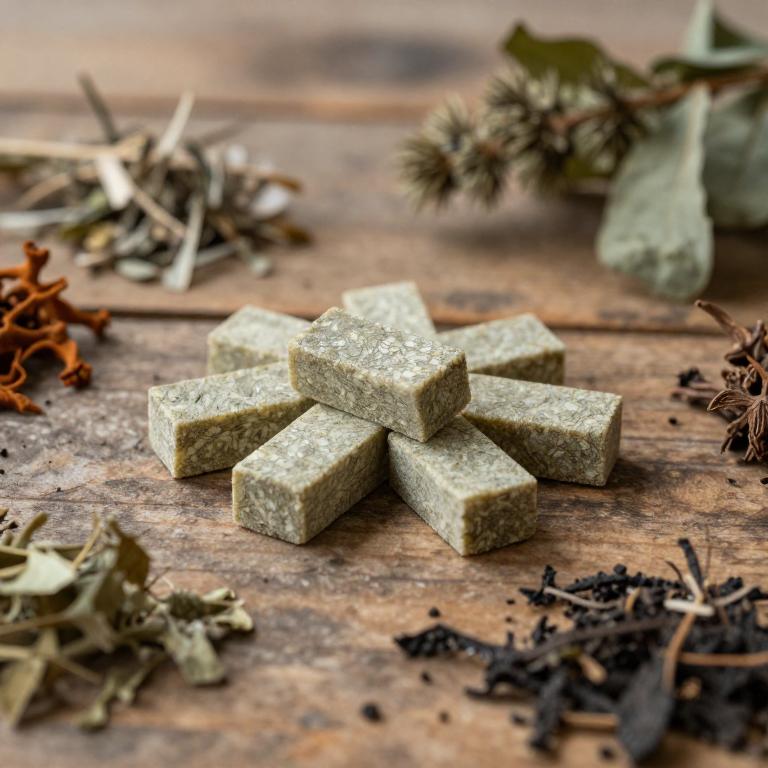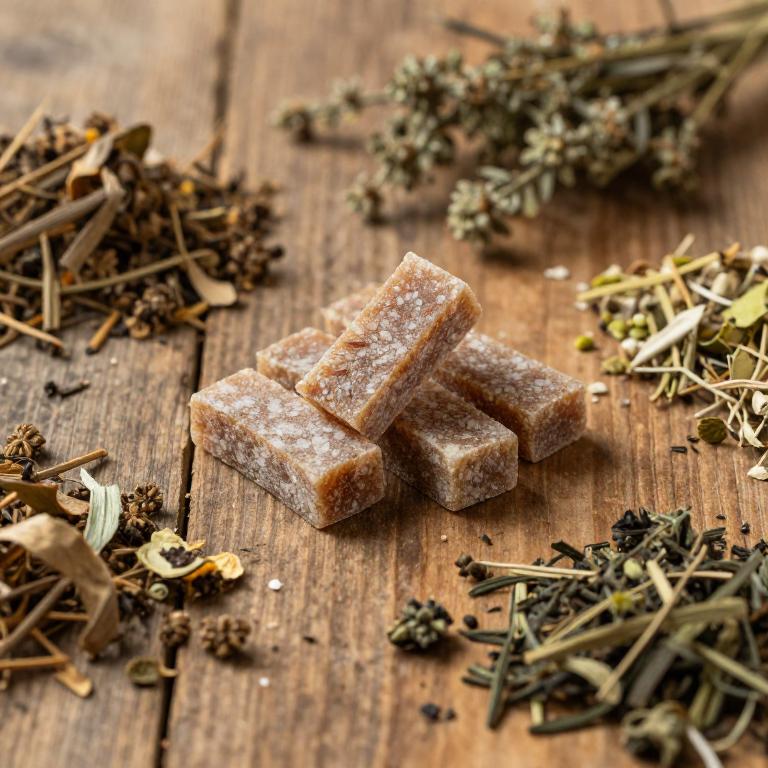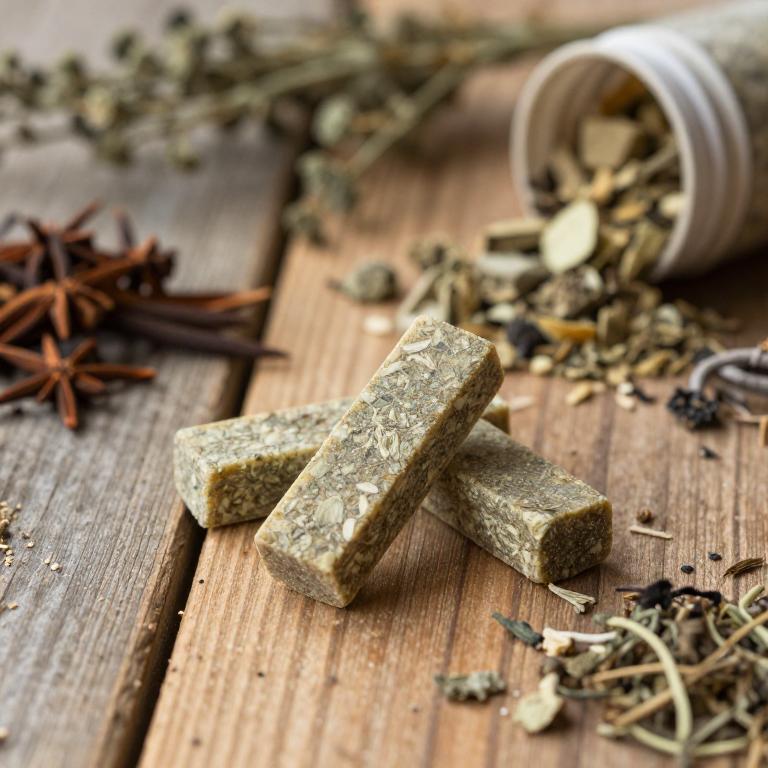10 Best Herbal Lozenges For Acute Bronchitis

Herbal lozenges are commonly used as a natural remedy for acute bronchitis, offering a soothing effect on irritated throat tissues and potentially reducing coughing.
They often contain ingredients such as echinacea, thyme, and licorice root, which are believed to have antimicrobial and anti-inflammatory properties. These lozenges may help alleviate symptoms like sore throat and excess mucus, though their effectiveness can vary depending on the specific herbs used. While they are generally considered safe for most people, it is important to consult a healthcare provider before use, especially for those with allergies or chronic health conditions.
Overall, herbal lozenges can serve as a complementary treatment alongside conventional care for managing the discomfort of acute bronchitis.
Table of Contents
- 1. Eucalyptus (Eucalyptus globulus)
- 2. Thyme (Thymus vulgaris)
- 3. Ginger (Zingiber officinale)
- 4. Fennel (Foeniculum vulgare)
- 5. Black elderberry (Sambucus nigra)
- 6. Peppermint (Mentha piperita)
- 7. Ceylon cinnamon (Cinnamomum zeylanicum)
- 8. Licorice (Glycyrrhiza glabra)
- 9. Salvia (Salvia officinalis)
- 10. Stinging nettle (Urtica dioica)
1. Eucalyptus (Eucalyptus globulus)

Eucalyptus globulus, commonly known as eucalyptus, is a medicinal plant widely used in herbal remedies for respiratory conditions.
Eucalyptus globulus herbal lozenges are formulated to provide relief from the symptoms of acute bronchitis by leveraging the plant's natural anti-inflammatory and expectorant properties. These lozenges help to soothe irritated throats, reduce coughing, and ease the clearance of mucus from the airways. The essential oils in eucalyptus, such as cineole, contribute to their effectiveness in alleviating respiratory discomfort.
When used as part of a holistic treatment plan, these lozenges can support faster recovery and improved breathing in individuals suffering from acute bronchitis.
2. Thyme (Thymus vulgaris)

Thymus vulgaris herbal lozenges, derived from the herb Thymus vulgaris, are traditionally used to support respiratory health and alleviate symptoms of acute bronchitis.
These lozenges contain thyme extract, which is rich in essential oils like thymol and carvacrol, known for their antimicrobial and anti-inflammatory properties. By reducing throat irritation and soothing coughing, they may help ease the discomfort associated with acute bronchitis. The herbal formulation is often preferred by individuals seeking natural remedies, though it is advisable to consult a healthcare provider before use, especially for those with underlying conditions or taking other medications.
Overall, Thymus vulgaris lozenges can serve as a complementary therapy to support recovery from acute bronchitis.
3. Ginger (Zingiber officinale)

Zingiber officinale, commonly known as ginger, has been traditionally used for its anti-inflammatory and antioxidant properties, making it a potential natural remedy for acute bronchitis.
Ginger herbal lozenges may help alleviate symptoms such as coughing, sore throat, and inflammation in the respiratory tract by reducing mucus production and soothing irritated airways. These lozenges are often preferred for their mild, pleasant taste and ease of use, especially in cases where conventional medications may cause side effects. While scientific evidence supporting their efficacy for acute bronchitis is limited, some studies suggest that ginger may enhance immune function and reduce oxidative stress.
As with any herbal remedy, it is advisable to consult a healthcare provider before using ginger lozenges, particularly for individuals with underlying health conditions or those taking other medications.
4. Fennel (Foeniculum vulgare)

Foeniculum vulgare, commonly known as fennel, has been traditionally used in herbal medicine for its soothing and anti-inflammatory properties.
Fennel herbal lozenges are often recommended for alleviating symptoms of acute bronchitis, such as coughing and throat irritation, due to their expectorant and antispasmodic effects. The essential oils in fennel, particularly anethole, help to reduce mucus congestion and ease breathing by relaxing the bronchial muscles. These lozenges are typically made from dried fennel seeds and are often combined with other herbs like licorice or eucalyptus for enhanced therapeutic benefits.
While they can provide symptomatic relief, they should not replace professional medical advice, especially for severe or persistent bronchitis cases.
5. Black elderberry (Sambucus nigra)

Sambucus nigra, commonly known as the European elderberry, has been traditionally used for its potential immune-supporting properties.
Herbal lozenges made from Sambucus nigra are often marketed for their ability to alleviate symptoms of acute bronchitis, such as coughing and throat irritation. These lozenges may help reduce inflammation in the respiratory tract due to their antioxidant and anti-inflammatory compounds. While some studies suggest elderberry may support immune function, more research is needed to confirm its effectiveness specifically for acute bronchitis.
As with any herbal remedy, it is important to consult a healthcare provider before use, especially for individuals with underlying health conditions or those taking other medications.
6. Peppermint (Mentha piperita)

Mentha piperita, commonly known as peppermint, is often used in herbal lozenges to alleviate symptoms of acute bronchitis due to its soothing and decongestant properties.
These lozenges can help reduce throat irritation and coughing by providing a cooling effect and easing mucus buildup in the respiratory tract. Peppermint contains menthol, which may help relax the muscles in the airways, making breathing easier during episodes of bronchial inflammation. While not a cure for acute bronchitis, peppermint lozenges can offer symptomatic relief and support the body's natural recovery process.
It is important to consult a healthcare professional before using herbal remedies, especially if symptoms persist or worsen.
7. Ceylon cinnamon (Cinnamomum zeylanicum)

Cinnamomum zeylanicum, commonly known as cinnamon, is often used in herbal lozenges to support respiratory health, including in cases of acute bronchitis.
These lozenges may help soothe irritated throats and reduce coughing due to their antimicrobial and anti-inflammatory properties. Cinnamon contains compounds like cinnamaldehyde, which can help alleviate symptoms by reducing mucus production and easing bronchial inflammation. While not a substitute for medical treatment, cinnamon lozenges can be a complementary remedy to ease discomfort during recovery.
However, it is important to consult a healthcare provider before using them, especially for individuals with allergies or underlying health conditions.
8. Licorice (Glycyrrhiza glabra)

Glycyrrhiza glabra, commonly known as licorice root, has been traditionally used in herbal medicine for its anti-inflammatory and expectorant properties.
Glycyrrhiza glabra herbal lozenges are often used to alleviate symptoms of acute bronchitis, such as coughing and throat irritation, due to their soothing effect on the respiratory tract. The active compounds in licorice root, including glycyrrhizin and flavonoids, help reduce inflammation and mucus production, supporting respiratory health. These lozenges are typically prepared with a combination of licorice extract and other soothing ingredients like honey or peppermint oil to enhance their effectiveness.
While generally safe for short-term use, excessive consumption of licorice root can lead to side effects such as hypertension, so it is important to follow recommended dosages.
9. Salvia (Salvia officinalis)

Salvia officinalis, commonly known as sage, has been traditionally used for its antimicrobial and anti-inflammatory properties, making it a potential natural remedy for acute bronchitis.
Herbal lozenges containing salvia officinalis may help soothe irritated throat tissues and reduce coughing associated with bronchial inflammation. These lozenges are often preferred for their mild, pleasant taste and ease of use, especially in cases where conventional medications are not desired. While more research is needed to confirm their efficacy, some studies suggest that sage may support respiratory health by reducing mucus production and enhancing immune function.
As with any herbal remedy, it is advisable to consult a healthcare professional before using salvia officinalis lozenges, particularly for individuals with pre-existing medical conditions or those taking other medications.
10. Stinging nettle (Urtica dioica)

Urtica dioica, commonly known as stinging nettle, has been traditionally used for its anti-inflammatory and expectorant properties, making it a potential natural remedy for acute bronchitis.
Herbal lozenges containing Urtica dioica may help alleviate symptoms such as coughing and throat irritation by reducing mucus production and soothing inflamed airways. These lozenges are often formulated with other herbal ingredients to enhance their effectiveness and provide a more comprehensive approach to symptom management. While they are generally considered safe, it is important to consult with a healthcare provider before use, especially for individuals with allergies or existing health conditions.
Clinical evidence supporting the efficacy of Urtica dioica lozenges for acute bronchitis is limited, but preliminary studies suggest promising results in reducing respiratory symptoms.